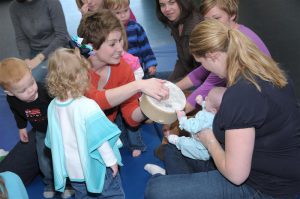Before human beings spoke…before we defeated time and became immortal by drawing pictures on cave walls…we made music. Somewhere, one of our ancestors took a stick, hit a rock, and music was born. With this in mind, music is our birthright. But for some of us, we think it’s beyond our understanding or something we simply consume like popcorn at the movies. Here are some of the most common misconceptions about music…
1. Making music is for musicians only.
Well that’s just silly. The hardest step is always the first one. Can you bang on a can? Do  you hum in the car or sing in the shower? Well – guess what? YOU are a musician! Just because you aren’t doing it for a living doesn’t mean you can consider yourself a musician. Think about it: Chorus America states there are about 42.6 million people singing approximately 270,000 choirs in the US. That is a lot of people. You could be one of them! If you can walk you can dance; if you can talk you can sing!
you hum in the car or sing in the shower? Well – guess what? YOU are a musician! Just because you aren’t doing it for a living doesn’t mean you can consider yourself a musician. Think about it: Chorus America states there are about 42.6 million people singing approximately 270,000 choirs in the US. That is a lot of people. You could be one of them! If you can walk you can dance; if you can talk you can sing!
2. Music is a privilege.
No! Music is a necessity of the human condition – like food or breathing. Think about it – in some of our darkest moments – the concentration camps of WWII or slavery in the US – those people, just trying to survive – produced beautiful music! Music is not something for a select few simply because it’s fun (though the fun part is true). Music is a basic need, like food or water – it’s not a privilege. Music expresses that which can’t simply be said or written down – we need it. It crosses socio-economic and cultural divisions and brings people together. Remember this children’s orchestra in Paraguay? They play instruments made from recycled trash! Take a moment and imagine a world without music. No film scores…no songs on the radio…no rock bands…no singing in the shower. That is a boring, colorless world.
3. It’s too early to start learning about music – or too late!
Scientists constantly tell us the benefits of music – and it’s never too early get children involved. Take a look at how these 11 month old twins respond to their Dad’s guitar playing. They’re movin’, man! They are engaged! They are connected to each other and their parents through the music! Are your kids banging on pans? Let them! They are figuring out sounds and making neurological connections in their brains – real “science-y” stuff. But back to the kids – you can see them light up when the music starts. This is a no-brainer. Early is better but it’s never too late. (Here are the twins a year later, still dancing to the music with a more developed sense of steady beat!)
4. I’m tone deaf.
Lies and slander! Okay – there is an extremely small percentage – ridiculously small as to be statistically insignificant – that is biologically tone deaf. For you two people – you can be drummers! The rest of you just think you are tone deaf. We convince ourselves we can’t do it so we don’t. And when you don’t do something regularly, it becomes a bit harder to do it well! Do you drive a car with a standard transmission? Can you tell the difference between your brother and sister when they call on the phone? Guess what? You aren’t tone deaf!
5. Music is only something I can do alone.
Science warning!!! Did you know that when a group of people sing together, their heartbeats sync! Amazing! Making music builds community in amazing ways. Getting together in groups to make music may be beneficial for our health. It certainly helps with socialization for young kids. It gets them out of their shells, interacting with others, building new friendships, all while sharpening the mind! Music for music’s sake is wonderful, but the science is real: a mind engaged by music yields a host of benefits beyond the wonderful joy of the art itself. And group musical instruction does much to help kids connect to others in a fun environment. Kindermusik is the perfect prescription from this music doctor; their music classes can make a world of difference for kids from birth!
 Consider this story – a group of kindergarteners were asked, “Who here can sing?” They ALL put their hands up. “I can sing!”…”Me, too! I’m really good!” That same group, three years later – asked the same question. About 20% fewer kids said they could sing. The same group three years later? Another 20% decide they can’t sing. By the time that group is in high school? Less than 15% might say they sing well. Why? Well – most of the time, it’s lack of encouragement. Get them involved early and encourage artist exploration! Now is the time!
Consider this story – a group of kindergarteners were asked, “Who here can sing?” They ALL put their hands up. “I can sing!”…”Me, too! I’m really good!” That same group, three years later – asked the same question. About 20% fewer kids said they could sing. The same group three years later? Another 20% decide they can’t sing. By the time that group is in high school? Less than 15% might say they sing well. Why? Well – most of the time, it’s lack of encouragement. Get them involved early and encourage artist exploration! Now is the time!
Contact Kindermusik to learn how you can be part of an amazing experience for your child.
Contributed by Dr. Mark A. Boyle, Director of Choral and Vocal Activities at Seton Hill University. He is sought after nationwide as a guest conductor, soloist, and clinician.